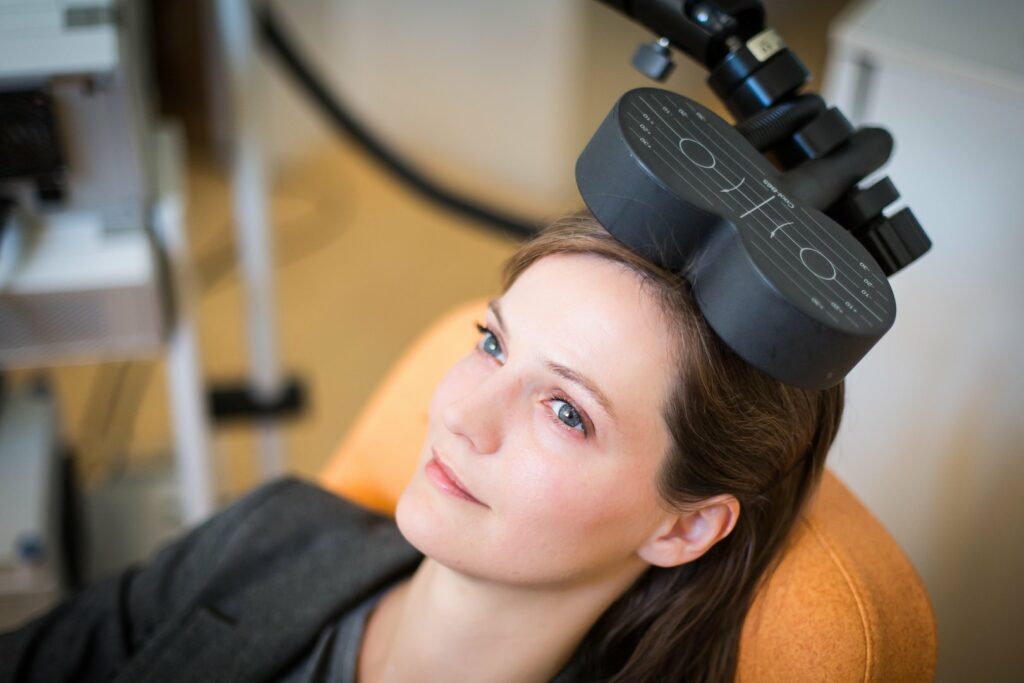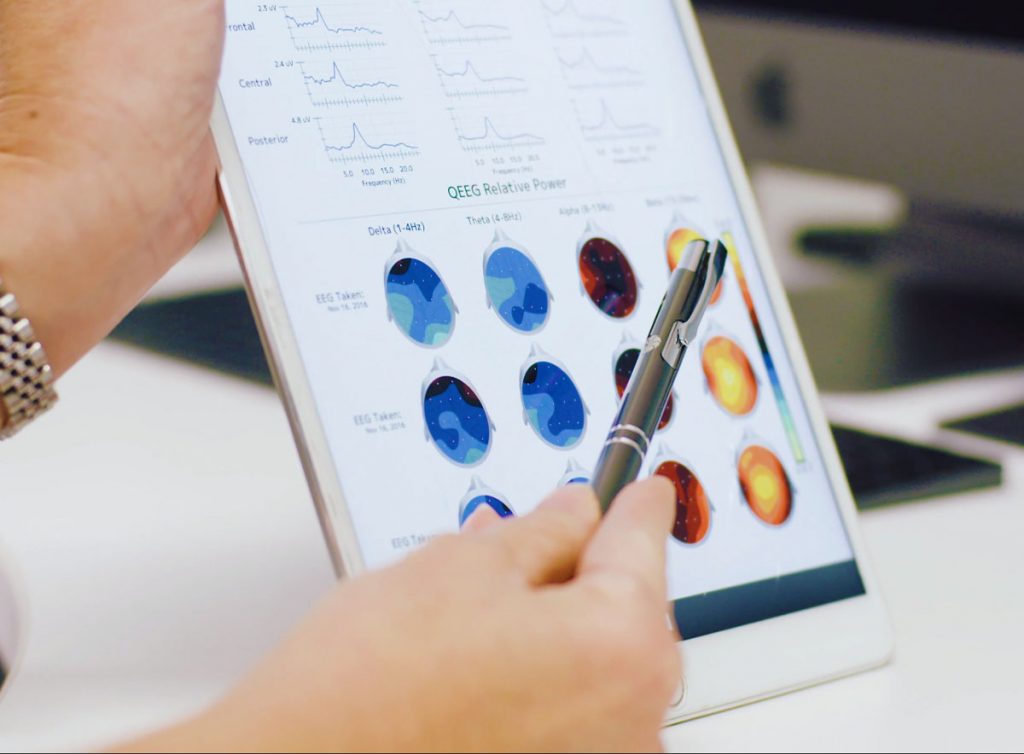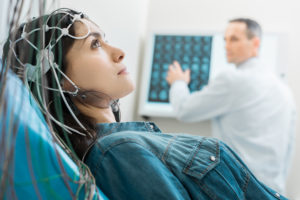A New Treatment Approach Offers New Hope for Traumatic Brain Injury
This drug-free, non-invasive treatment addresses long-term adverse effects from a TBI or concussion

“A whole new lease on life.”
David was diagnosed with a traumatic brain injury in 2011. As a result, he couldn’t help his wife care for their home or their two young children, no matter how hard he tried. Desperate, he spent five years looking for answers. This included seeing 46 specialists who delivered 29 different treatments. They also prescribed a huge number of drugs and supplements. The results? Some improvement, but no real quality of life. And a drug addiction problem. But David kept looking. And he found the Brain Treatment Center. After that, everything changed. “Within two weeks, I was sleeping better,” he said. “I was off all 12 of the meds I was on when I began treatment, and I was starting to enjoy life again.” And things just kept improving: After a month, he was socializing with people and helping around the home. Then, after six weeks, David reported that almost 70% of his symptoms were reduced. “I have a whole new lease on life,” he said. “I feel good about myself, confident, and can laugh again. Most importantly, I can feel the love for—and from—my family again.” Stories like David’s are not uncommon. That’s why we’re proud to offer this breakthrough treatment. It’s called MeRT, or Magnetic e-Resonance Therapy. And it’s helped thousands overcome the painful, overpowering effects of traumatic brain injury.
The MeRT Approach to Traumatic Brain Injury or Concussion
 MeRT combines three procedures:
MeRT combines three procedures:
- Transcranial Magnetic Stimulation (TMS, an FDA cleared therapy),
- Quantitative Electroencephalogram (qEEG), and
- Electrocardiogram (ECG/EKG).
The EEG is key to the success of the MeRT treatment. Here’s why: Patients with a traumatic brain injury have markers that are clearly visible in their EEG studies. The EEG can show us an imbalance in brainwave activity. Then, through a highly personalized treatment plan, we strengthen healthy brainwave activity. This can improve brain connectivity and communication. In many cases, this has greatly improved recovery results. * * Results are based on active and strict observation of our regimens. Results may vary based on the individual user and are not guaranteed.
Contact our New Patient Coordinator for more information
Call us: 407-730-4240
Or fill in the form below and she will contact you.
What is Traumatic Brain Injury (TBI)?
The CDC (Centers for Disease Control and Prevention) defines TBI as “an injury that affects how the brain works. It may be caused by a:
- Bump, blow, or jolt to the head, or
- Penetrating injury (such as from a gunshot) to the head”
There are three main types of TBI: Mild TBI or concussion, Moderate TBI, and Severe TBI. A traumatic brain injury can affect people of all ages. Some of the most common ways people get TBIs are from a fall, a firearm-related injury, a motor vehicle crash, or an assault. When you receive a TBI, your brain can bounce around or twist in the skull. This can also cause chemical changes in your brain or brain cell damage. And depending on how severe the injury is, a TBI can cause health problems that last from a few days to the rest of your life. A person with a mild TBI or concussion may feel better within a couple of weeks or months. And a person with a moderate or severe TBI may have long-term or life-long effects from the injury.
Traumatic Brain Injury Symptoms
Some of the more common TBI symptoms include:
Loss of consciousness
- Headaches
- Fatigue or lethargy
- Dilated pupils and vision changes
- Dizziness
- Memory problems
- Confusion
- Cognitive decline
- Inappropriate emotional responses
- Anger
- Depression
- Feeling of isolation
- PTSD (post-traumatic stress disorder)
- Anxiety or panic attacks
- Facial weakness
- Weakness or loss of function in other parts of the body
- Loss of bladder or bowel control
- Breathing problems
- Numbness and tingling in different parts of the body
- Loss of hearing or tinnitus
These symptoms can vary based on the severity of the TBI. If left untreated, a traumatic brain injury can lead to a shortened life span and significant complications.
Benefits* from MeRT Treatment
According to patients, MeRT treatment can be life-changing.* Benefits can include:
- Better sleep and increased sleep duration
- Increased focus and clarity of thought
- More self-confidence and self-esteem
- Greater ability to adapt
- Better concentration and focus
- Improved memory
- Reduced anxiety and depression
- Increased emotional stability
- Better self-control
- Improved mood
- Greater sociability
- More motivation
* Results are based on active and strict observation of our regimens. Results may vary based on the individual user and are not guaranteed.
How to Find Out More About MeRT for Traumatic Brain Injury
MeRT is a relatively new treatment, so you may have many questions as to whether it’s the right treatment for your TBI or concussion. We understand, and we’re here to make it as easy as possible for you to get the information you need. We also know that this is not a light decision to make. Your first step is as simple as a phone consultation with our New Patient Coordinator. You can discuss symptoms and history, ask all the questions you want, and have her explain the treatment in full. This includes all fees and protocols.
Call us: 407-730-4240
Or fill in the form below and she will contact you.
Traumatic Brain Injury Treatment: What to Expect
Once you decide to take the next step, we then set up two separate appointments. Each of these appointments will last 45 minutes to an hour. After this, we have an assessment period where the actual procedure and monitoring take place.
EEG Testing
On your first appointment, we perform the qEEG and ECG/EKG. These tests are simple and painless and done right in our office. For the EEG, we place a cap on your head to measure the electrical activity in your brain. This will map out any areas which are not performing as they should. Additionally, in the EKG, we attach electrodes to your chest to record your heart’s electrical signals. Once we perform the tests, our team will carefully analyze the results. Based on this analysis, we develop a treatment plan customized to your specific condition and schedule your assessment period of treatment.
Consultation
Your second appointment, after your qEEG/EKG, is a one-on-one consultation. You can do this either in person or virtually from the comfort of your home. We will discuss your test results and treatment protocols, answer any questions you may have, and let you know more about what to expect during your assessment period.
Assessment Period
In this step, we will perform a short period of treatment, followed by a new EEG to see how you’re responding to the treatment. We determine progress based on the new EEG results compared to the initial one done, and we look at symptom improvements.
 Founder and Medical Director
Founder and Medical Director
Gilbert Mbeo, MD is a triple board-certified physician who specializes in Neurology, NeuroIntensive Care, and Interventional Pain Management, with over 13 years of experience providing evidence-based, high-quality care to patients with acute neurological needs including acute stroke, neuromuscular respiratory failure, status epilepticus, and brain and spinal cord trauma.
Dr. Mbeo is a Neurointensivist, meaning that not only does he have an in-depth understanding of neurology and neurological conditions, but his expertise is in the care of critically ill neurologic patients with acute brain, spine, and neuromuscular disorders. This specialty is also referred to as neurologic intensive care, critical care neurology, and neurocritical care. After learning about the brain healing effects of neuromodulation Dr. Mbeo established the Brain Treatment Center Orlando in order to use interventions like cognitive rehabilitation, Magnetic Resonance Therapy (MeRT), and transcranial magnetic stimulation as non-invasive treatment options for an array of neurological conditions.
Contact Our New Patient Coordinator for More Information
Our New Patient Coordinator is available to answer any questions that you may have about how MeRT can help you. She’ll take the time to listen to your concerns, answer your questions, explain costs, and put your mind at ease. She can also assist you in getting scheduled should you decide to move forward with treatment. We understand what you may be going through, and our goal is to help guide you through the process with quality care in a warm and compassionate environment. Many MeRT clinicians and technicians have gone through treatment themselves. As a result, they know first-hand what this treatment can do. That’s why they’re passionate about helping you to heal.
Call Us Today. We are Here to Help.
Our New Patient Coordinator will take the time to answer your questions, listen to your concerns, and explain our procedures.
Call us: 407-730-4240
Or fill in the form below and she will contact you.
Contact Us
For more information or to speak with our New Patient Coordinator, please fill in the information below.


 Loss of consciousness
Loss of consciousness

 Founder and Medical Director
Founder and Medical Director